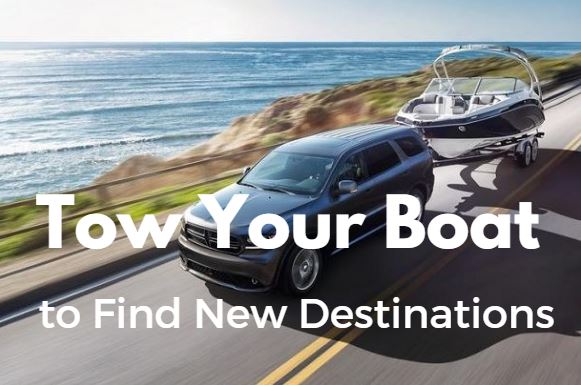
Trailering can add new dimensions to the sense of freedom that comes with boating, and that’s one of the reasons it’s so popular. With a trailerable boat, you’re free to boat on just about any lake, river, bay or inlet. Trailering is great way to explore different waterways in your state or region it’s also the most affordable way to store your boat. The tips below can help you learn all about towing your boat! From DiscoverBoating.com.
Getting Started
Weighing In
The owner’s manual of your boat will list the “dry” weight of the boat, less fuel and gear. When you’re assessing your vehicle’s towing capacity, be sure to add several hundred pounds to the dry weight to account for gear, gas and accessories.
Muscle Power
As the weight, length and beam (width) of a given boat increase, so does the muscle power needed to launch and retrieve it. A small boat may be easy for one person to handle at the ramp, but larger boats (generally those more than 25 feet) may require additional hands. Don’t be afraid to ask for help at the ramp if you need it, trailer boaters are always happy to help.
Consult Your State Laws
Trailering laws vary somewhat from state to state. Special requirements may apply and often are based on weight and beam.
Boat Trailer Maintenance
Trailer hubs and lights are submerged twice every time you go boating. An essential element of boat trailer maintenance is to pamper them as you would your boat. Make sure to do an occasional inspection by inspecting the grease fittings on the hubs. Remove the rubber cap if there is one, then try to rock the grease fitting back and forth. If it rocks, you need more grease. Any service station can add it quickly and cheaply in a matter of minutes.
When you trailer your boat, it’s a good idea to stop periodically and lightly and quickly pat the wheel hubs. If they are too hot to touch, Your hubs need grease at least, and possibly replacement. Check your lights before each trip. Have a friend or family member stand behind your trailer while you activate the brake lights, headlights and turn signals. If you boat in saltwater, thoroughly rinse your trailer, paying special attention to the brakes, axles, hubs and bunk mounts. Many trailers don’t come with a spare tire and none come with a jack. Sometimes your car jack will lift it. And, sometimes your car’s tire tool will loosen and tighten the lug nuts. Be sure they’ll work before you need them. When your boat is off the trailer inspect trailer bunks to be sure the padding isn’t worn or embedded with grit or gravel that will mar your boat.
Posted by Scott Freerksen “The Lake Guy”
